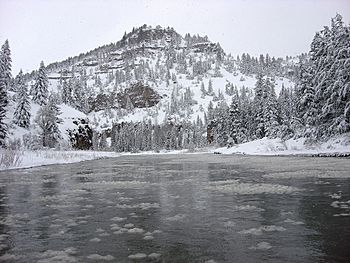Smith River (Montana) facts for kids
Quick facts for kids Smith River |
|
|---|---|
 |
|
| Country | Cascade and Meagher County, Montana |
| Physical characteristics | |
| Main source | 46°31′44″N 110°58′40″W / 46.52889°N 110.97778°W |
| River mouth | 3,330 feet (1,010 m) 47°24′49″N 111°28′43″W / 47.41361°N 111.47861°W |
| Basin features | |
| River system | Missouri River |
The Smith River is a beautiful river located in the middle of Montana, in the United States. It is a smaller river that flows into the much larger Missouri River. The Smith River begins in the Castle Mountains in southern Meagher County. It then travels northwest through a valley. This valley is nestled between the Big Belt and Little Belt mountain ranges. Along its path, it flows past towns like White Sulphur Springs and Smith River State Park. Finally, it joins the Missouri River about 9 miles (14 kilometers) southwest of Great Falls.
Contents
Fun on the Smith River
The Smith River is a great place for outdoor activities. It is especially popular for floating and fishing.
River Rating for Fun
From a place called Camp Baker Fishing Access site, all the way to where it meets the Missouri River, the Smith River is considered a Class I river. This means the water is mostly calm and easy to float on. It's a good spot for people to enjoy the river for fun.
A Special River Trip
The Smith River is famous for its amazing views and excellent fishing. Many people come here to catch trout. What makes this river unique is how it's managed. For a long 59-mile (95-kilometer) section, there's only one public spot to start your trip and one public spot to finish. This helps keep the river wild and special.
Along this remote river canyon, there are special places called "boat camps." These camps help protect the natural beauty of the area. The section of the Smith River between Camp Baker and Eden Bridge is managed by Montana Fish, Wildlife & Parks. This means you need a special permit to float on this part of the river.
Getting a Permit
Permits for private trips on the Smith River are given out through a lottery system. This lottery happens before the spring floating season begins. If you want to apply for a permit, applications are usually available in the first week of January each year. The deadline to apply is typically in mid-February.
What's Happening Near the River?
Areas close to the Smith River are currently being looked at for a possible mining project. Local officials in Meagher County and state agencies are studying the plans for something called the Black Butte Copper Project.
 | Sharif Bey |
 | Hale Woodruff |
 | Richmond Barthé |
 | Purvis Young |

